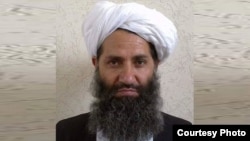A high-powered commission set up by Afghanistan’s Taliban has been working to press anti-Pakistan militants to stop violence against the neighboring country and return to their homes across the border with their families, VOA has learned from highly-placed sources.
Taliban chief Hibatullah Akhundzada set up the three-member commission recently to look into Islamabad’s complaints that the banned Tehrik-i-Taliban Pakistan (TTP), commonly known as the Pakistani Taliban, is using Afghan soil to plot cross-border terrorist attacks, the sources said.
“TTP leaders are being warned (by the Afghan Taliban Commission) to settle their problems with Pakistan and return to the country along with their families in exchange for a possible amnesty by the Pakistani government,” said the sources in Islamabad.
The sources privy to the matter revealed the details on condition of anonymity, citing the “sensitive nature” of the matter and for not being authorized to speak to media.
Pakistan and Afghan Taliban officials have not publicly commented on the development.
On Friday, Pakistani Foreign Ministry spokesman Zahid Hafeez Chaudhri said Islamabad intends to raise the TTP-related concerns with Kabul.
“We have been taking up the issue of use of Afghan soil by the TTP for terrorist activities in Pakistan with the previous Afghan government and we will continue raising the issue with the future Afghan government as well to ensure that TTP is not provided any space in Afghanistan to operate against Pakistan,” Chaudhri told his weekly news conference.
The sources, while speaking to VOA, ruled out the possibility of Pakistan accepting any TTP demands, insisting the amnesty would be offered in line with the country’s constitution and law of the land, that require the militants to surrender their firearms in order to protect Pakistan’s years of counterterrorism gains.
The United States and the United Nations have also listed the TTP as a global terrorist organization.
The February 2020 deal reached between the Taliban and the United States in Doha, which paved the way for foreign troops to leave Afghanistan, binds the Islamist group to prevent regional as well as transnational terrorist groups from using Afghan soil to threaten global security.
"This concern is legitimate, and our policy is clear that we will not allow anyone to use the soil of Afghanistan against any neighboring country, including Pakistan. So they should not have any concern,” Taliban spokesman Suhail Shaheen told VOA, without sharing further details.
Shaheen said be it TTP or any other terrorist group they “will have no place in our country and that’s a clear message to all.”
The Taliban are in desperate need of support from regional and international countries now that they are in control of Afghanistan to address governance as well as critical economic challenges facing the country, one of the poorest in the world.
Analysts say it would be extremely difficult for the Taliban to disregard reservations of all the neighboring countries, including Pakistan, on the presence of terrorists which have targets across the Afghan border.
“If they (the Afghan Taliban) fail to deliver on their counterterrorism commitments, not only Pakistan but China, Russia, Iran and Central Asian countries would all be upset because they also complain that fugitive militants sheltering on Afghan soil threaten their national interests,” the Pakistani sources stressed.
“Can they survive if they turn their guns against us and support TTP? This is not possible. Our trade routes are a lifeline for them, for landlocked Afghanistan,” the sources added.
The Taliban regained power in Kabul last week after overrunning most of Afghanistan within the past two weeks in a largely unexpected development.
But the Kabul takeover has largely been peaceful and the Islamist group is currently consolidating its power by engaging former Afghan rivals in their bid to form an inclusive government in order to win international recognition for it.
Pakistan has over the past five years constructed a robust fence and hundreds of forts along what used to be its historically open border with Afghanistan. The massive project, say Pakistani military commanders, has effectively blocked militant infiltration in either direction.
TTP militants are blamed for killing tens of thousands of Pakistanis since their emergence in 2007 in retaliation for Islamabad’s decision to cooperate with Washington in the war against terrorism.
The group used strongholds in semiautonomous federally administered tribal areas, known as FATA, bordering Afghanistan.
But sustained military operations forced TTP members to flee into volatile Afghan border areas and traditionally lawless FATA areas have recently been merged into mainstream Pakistan, which officials say have significantly reduced terrorism incidents across the country.
Critics, however, are skeptical about whether the Afghan Taliban would want to upset groups like TTP and the anti-China East Turkistan Islamic Movement, which sided with the Islamist group in its insurgency against U.S.-led international forces in Afghanistan.






